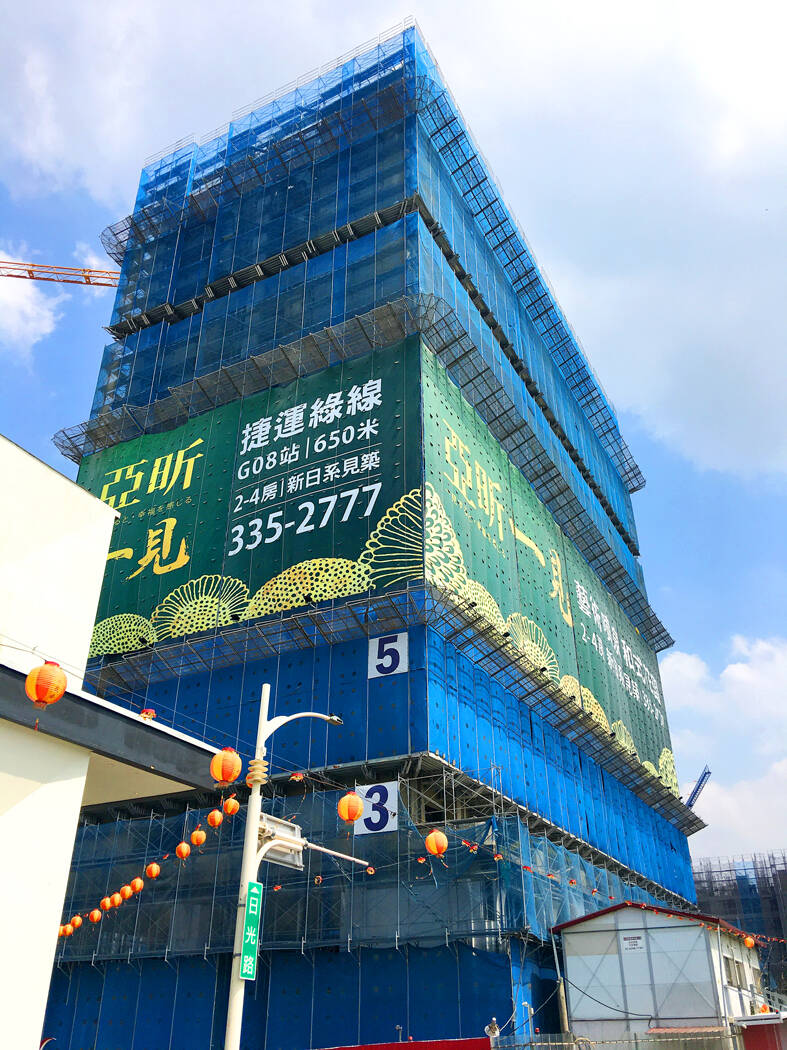YeaShin International Development Co (亞昕國際開發) is predicting explosive profit growth next year and beyond, despite economic uncertainty and monetary tightening slowing earnings this year.
The New Taipei City-based developer posted net income of NT$156 million (US$5 million) in the first three quarters, or earnings per share (EPS) of NT$0.4, company data showed.
That represented a decline of 39.39 percent from EPS of NT$0.66 during the same period last year, as COVID-19 outbreaks, interest rate hikes and unfavorable policy measures drove prospective buyers to the sidelines, it said.

Photo: Hsieh Wu-hsiung, Taipei Times
Revenue in the first 10 months of the year shrank 5.8 percent year-on-year to NT$2.76 billion, it said.
However, YeaShin expects a turnaround next year, when it wraps up more than US$10 billion worth of projects and books profits, it said.
A project in New Taipei City’s Linkou District (林口) would generate NT$3.4 billion of sales, a residential complex in Taipei’s Datong District (大同) would contribute NT$5 billion, a project in Taoyuan would bring in NT$2.4 billion, a residential complex in Miaoli County would provide NT$2 billion and a project in Taichung would account for NT$1.2 billion, company data showed.
YeaShin, dubbed “the king of Linkou,” where it owns a hotel and has developed several housing projects, is seeking to duplicate the successful business model in Taichung in the coming years.
Toward that end, YeaShin has acquired 6,000 ping (19,8035m2) of idle land in northern Taichung that would be converted into NT$30 billion worth of apartment complexes, it said.
The developer said it had sold out two batches of presale apartments in Taichung this year, and would be able to recognize profits after construction is completed and the units are turned over to buyers.
The two projects would generate NT$3 billion of sales, it said.
YeaShin is outperforming a lackluster market, with housing transactions across the nation dropping 28 percent last month.The company attributed the phenomenon to real demand in central Taiwan and its positive image.
YeaShin said it would launch its third housing project in Taichung toward the end of this year, which would bring in another NT$3.3 billion of revenue.
Those projects would lend support to YeaShin’s top and bottom lines in the coming four to five years, it said.

NEW IDENTITY: Known for its software, India has expanded into hardware, with its semiconductor industry growing from US$38bn in 2023 to US$45bn to US$50bn India on Saturday inaugurated its first semiconductor assembly and test facility, a milestone in the government’s push to reduce dependence on foreign chipmakers and stake a claim in a sector dominated by China. Indian Prime Minister Narendra Modi opened US firm Micron Technology Inc’s semiconductor assembly, test and packaging unit in his home state of Gujarat, hailing the “dawn of a new era” for India’s technology ambitions. “When young Indians look back in the future, they will see this decade as the turning point in our tech future,” Modi told the event, which was broadcast on his YouTube channel. The plant would convert

‘SEISMIC SHIFT’: The researcher forecast there would be about 1.1 billion mobile shipments this year, down from 1.26 billion the prior year and erasing years of gains The global smartphone market is expected to contract 12.9 percent this year due to the unprecedented memorychip shortage, marking “a crisis like no other,” researcher International Data Corp (IDC) said. The new forecast, a dramatic revision down from earlier estimates, gives the latest accounting of the ongoing memory crunch that is affecting every corner of the electronics industry. The demand for advanced memory to power artificial intelligence (AI) tasks has drained global supply until well into next year and jeopardizes the business model of many smartphone makers. IDC forecast about 1.1 billion mobile shipments this year, down from 1.26 billion the prior

People stand in a Pokemon store in Tokyo on Thursday. One of the world highest-grossing franchises is celebrated its 30th anniversary yesterday.

Zimbabwe’s ban on raw lithium exports is forcing Chinese miners to rethink their strategy, speeding up plans to process the metal locally instead of shipping it to China’s vast rechargeable battery industry. The country is Africa’s largest lithium producer and has one of the world’s largest reserves, according to the US Geological Survey (USGS). Zimbabwe already banned the export of lithium ore in 2022 and last year announced it would halt exports of lithium concentrates from January next year. However, on Wednesday it imposed the ban with immediate effect, leaving unclear what the lithium mining sector would do in the